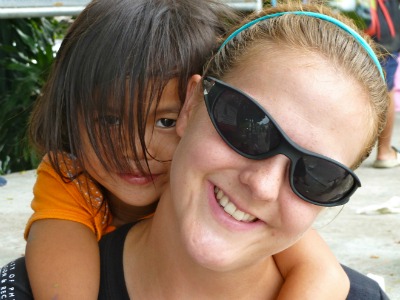
Christine Miller with a Thai child
International service-learning program promotes 'curiosity before judgment' as students work and play in Thailand and Cambodia
Every year the Faculty of Physical Education and Recreation prepares and sends University of Alberta students - 10 this past year - to Thailand and Cambodia as part of its Play Around the World program to work with organizations or agencies in the development and delivery of play programs for people who are generally underserved. Students serve and learn with orphans, street children, kids with HIV AIDS, and people with intellectual or physical impairments.
PAW as it's called, is a service-learning, experience that's firmly rooted in the academic curriculum - and with clear goals. Mary Ann Rintoul is the manager for the program. "Play Around the World is premised on the United Nations' Charter of Rights and Freedoms that promotes access to, and participation in, physical activity as a right for every child, ," she says. "Our program is about three things: play leadership, global citizenry and the cross-cultural experience. A learning community with intentional critical reflective practices before, during, and after the PAW placement facilitates professional and personal growth in these core areas."
The student teams go to three cities - Chiang Mai and Pattaya in Thailand, and Phnom Penh in Cambodia. This is only the second year the teams have included Cambodia. Working in small teams, students are led by former PAW program participants to help them adjust, navigate an unfamiliar country and culture, and orient them to the agencies.
This year BPE/BEd student Christine Miller was one of those chosen to go to Pattaya in Thailand. One of her most vivid memories is of teaching swimming at a vocational school where a young man with stunted limbs and one arm desperately wanted to learn to swim freestyle. "At first he would keep his life jacket on. Then he got to the point where he was comfortable being able to swim without it. He'd always swim the butterfly but really wanted to learn freestyle. I offered to take him to the shallow end of the pool, and to walk beside him supporting his body with my hands. I told him, 'If you feel uncomfortable you can grab me with your arm and I'll pull you to the side.' We worked on this all summer and at the end he was able to swim freestyle. He needed to learn how to rotate his whole body with his arm. He was so proud. I was too."
Miller's small team of three ("We were like sisters!") worked with ten organizations in Pattaya, arranging play activities - once for 150 children in a massive play day. "Organizations were helpful in letting us know what they'd like us to work on. We got to know the kids and what they liked and build on the types of games we knew they'd enjoy."
Being immersed in a new culture can be an enormous adjustment, emphasizes Rintoul, who spends months with the student teams before they set off, with lessons in cultural awareness and sensitivity, global citizenship, play leadership, adapted physical activity delivery and language, among others. Students also fundraise for their trip and make public presentations. "We do everything we can to prepare students for a successful experience," she says.
Once in Thailand or Cambodia the teams don't have interpreters but Miller says weekly language lessons and the universal language of mime, facial expressions and acting often got the point across. "It was sometimes easier to work with the children because they would naturally mime or act something out to make themselves understood, but the adults were more dependent on language," she says.
Miller says one of the best parts was seeing kids pick up a game she'd shown them and play it on their own. "You'd play a game with the kids not really knowing if the kids would enjoy it or how it would go and it goes perfectly and kids love it and want to play it again. And then we'd do free play where the kids can do anything they want and you see them organizing themselves and playing that game you just showed them. That was really great."
Rintoul says, "Students often comment that they come away having learned more than they taught. It can be a very broadening, transformational experience. Often they want to act on what they've learned and their careers or studies will go in directions they'd never dreamed of before."
As for Miller, she spent three weeks travelling in Vietnam and Cambodia afterwards and, of her own volition visited an orphanage where she and her friends helped children learn English and with their letters. "We were in different classrooms working with the kids. Then we heard the sound of singing next door and we realized it was a game we'd played with kids in Thailand."
"It was really neat to see the universality of play."
The student teams for PAW 2012 are now gearing up.
More information about Play Around the World at http://bit.ly/playaroundtheworld